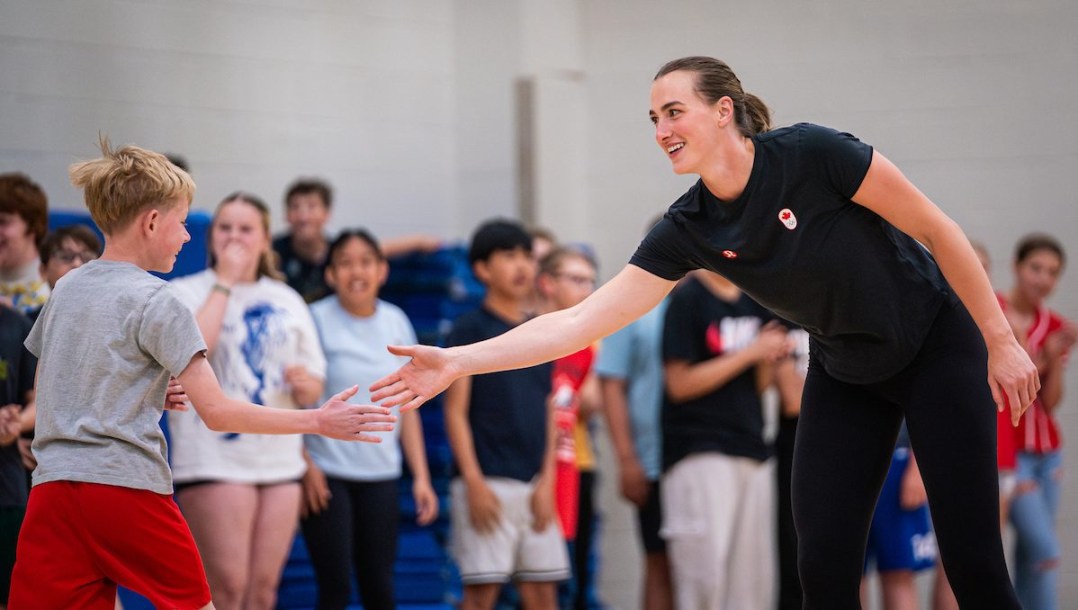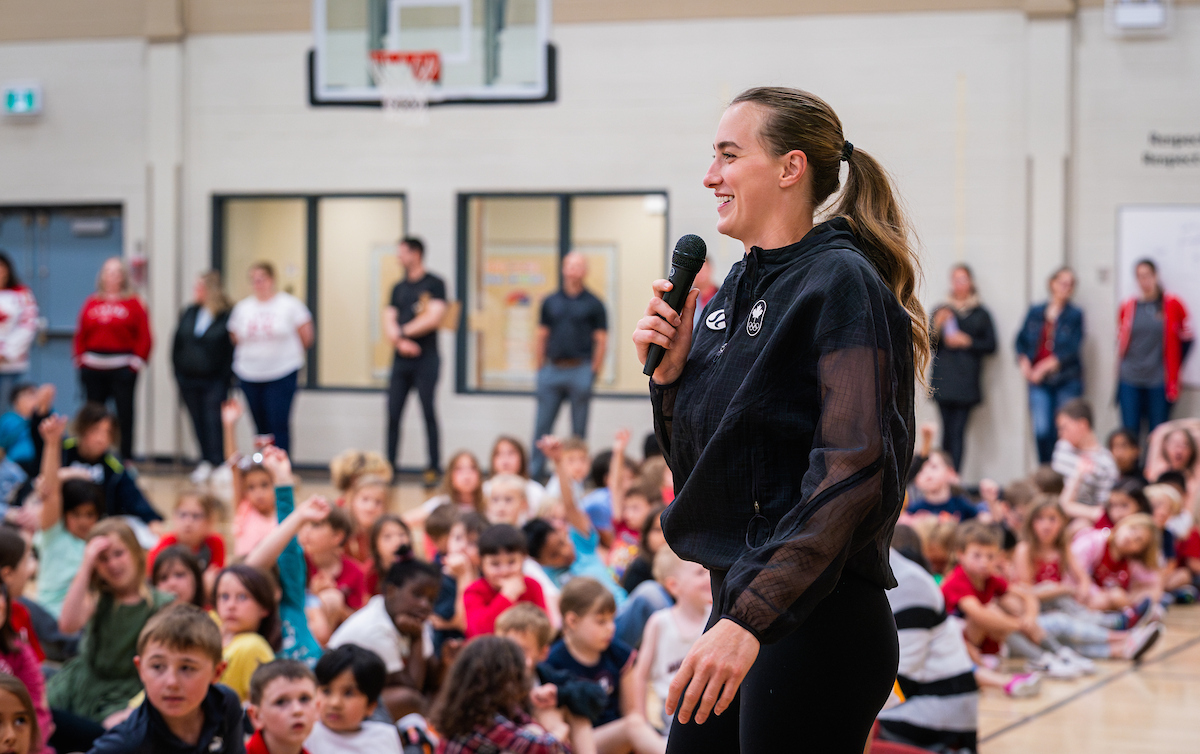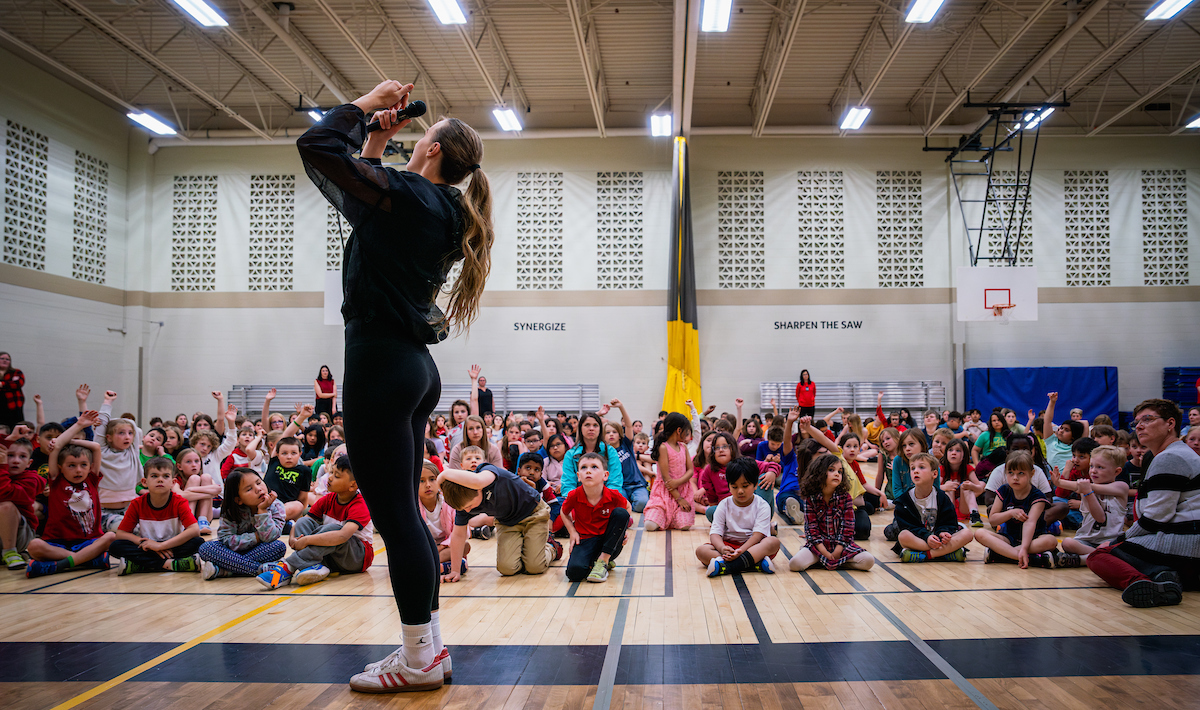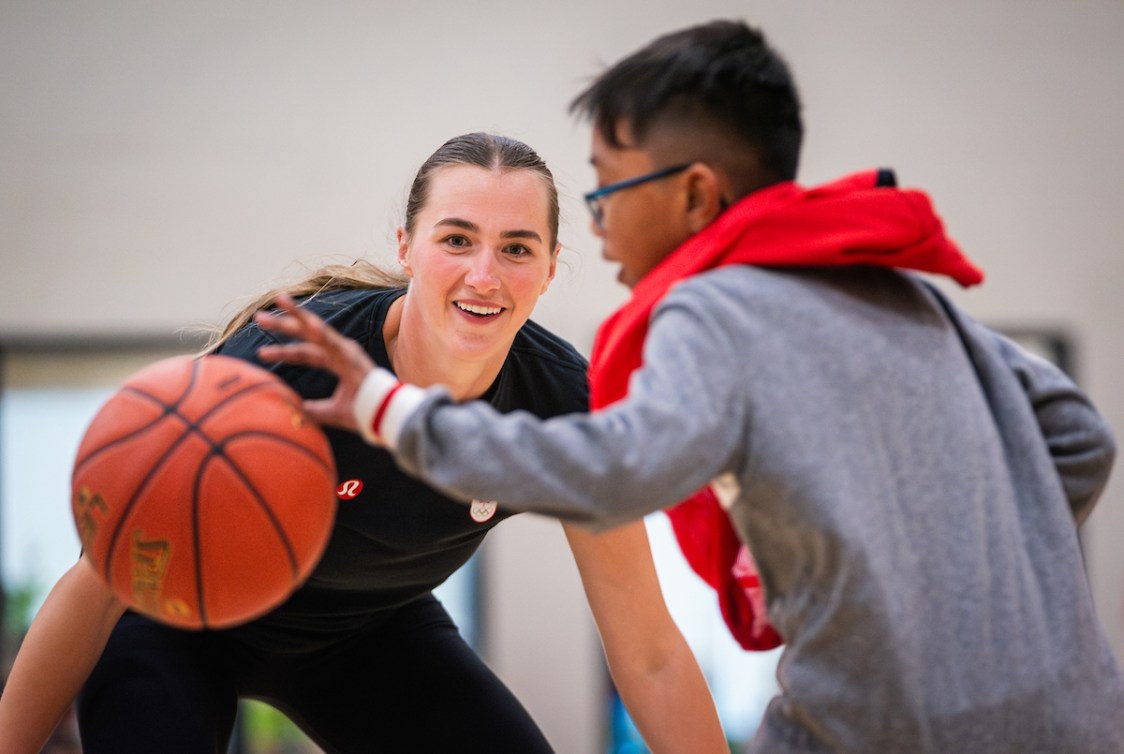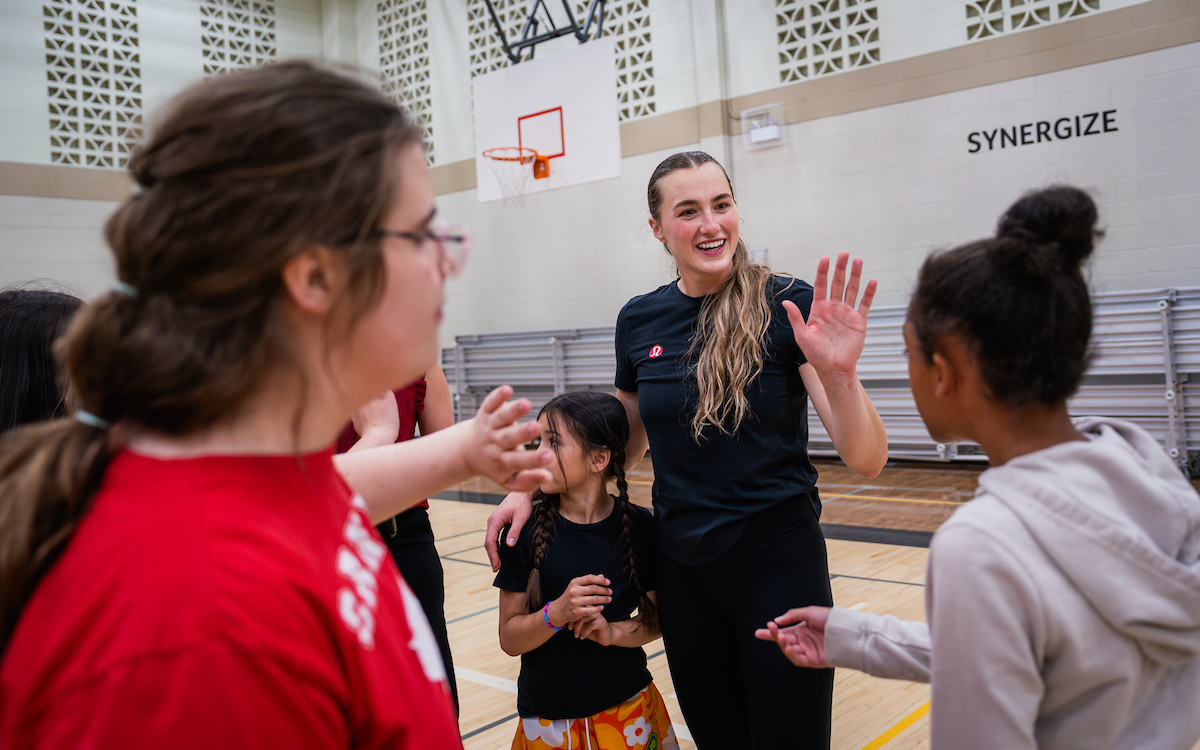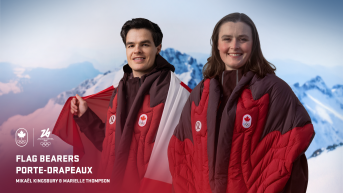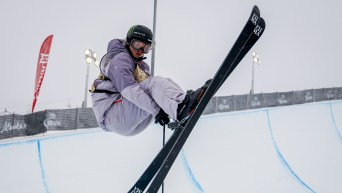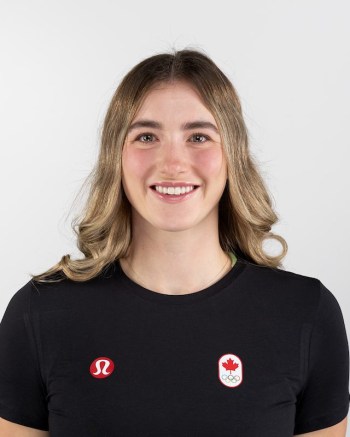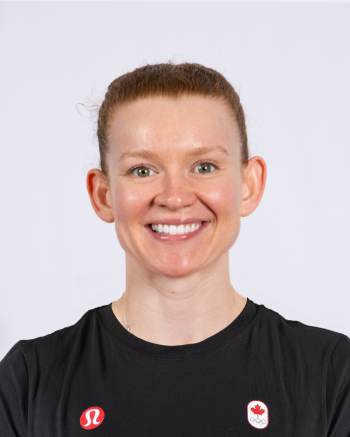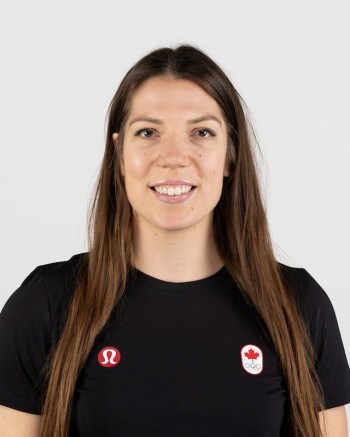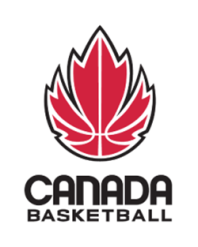Team Canada’s Paige Crozon is channelling Olympic momentum for good
Paige Crozon, along with her teammates Kacie Bosch, and twins Katherine and Michelle Plouffe, won the hearts of Team Canada fans for their determination to represent the nation as its first Olympic 3×3 team, their close team bond, and the special relationship that Crozon’s daughter, Poppy, has with the whole team.
Olympian is yet another title that Crozon has added to her already packed resumé, which includes manager of the Living Skies Indigenous Basketball League, founder of One Sky Sports, coach at the University of Lethbridge, and of course, mom to Poppy.
Crozon’s busy schedule is all centred around one core belief, though—the power of sport to change lives.
Olympic.ca caught up with Crozon to reminisce about her Paris 2024 experience, learn about her important work in the community, and get excited about the future of women’s 3×3 in Canada.
What are the moments that come to the forefront of your mind when you think about your Paris 2024 experience?
I remember when we walked onto the court for the first time for a scrimmage and saw the Olympic rings. Michelle, Katherine, and I just had a moment where we hugged each other because that’s what we had been working towards—that’s why we started playing 3×3 in the beginning. To see, kind of like, the fruition of the journey….I still get emotional thinking about it.
And then when we played France in France at the 10:00 p.m. game; it was sold out and I got fouled and went to the free throw line to shoot. Everyone, except for the Canadian fans, obviously, were booing me, but it was so loud. After the game, Poppy was crying because the little boys that she was sitting beside were booing her mom and she was so upset about it.
READ: Momentum: 3×3 basketball player Paige Crozon sheds light on elite sport and motherhood
And then just seeing how emotional and happy my family was. Every parent who has a child in sport knows the sacrifice and the demand it puts on you. I don’t think I really realized until I had Poppy how much my parents sacrificed, and not because they knew I was going to be an Olympian, but because it made me happy and it was something that I loved to do. So to be able to share that moment with them was so special. My mom was like, “Can I get the Olympic rings tattooed as well?” She was just so proud.
How has life been post-Olympics?
The last year has been an absolute whirlwind. I think leading up to Paris, it was so exciting because that was always my childhood dream to make it there.
Obviously, to finish fourth was a little bit disappointing for our team. After the Olympics, it was a little bit of processing all the exciting things that happened while also trying to work through some of the disappointment, but knowing that we left everything out there on the court. But yeah, there’s still some tenderness and disappointment with our finish, just because I feel like it would have been such a storybook way to end the journey we’ve had with the team.
I’ve been able to travel the country and share my love of 3×3 with youth across the country, but then also been able to speak openly and frankly about the disappointment, but then also to reframe it in terms of the resiliency that can come through challenging experiences.
READ: Canada battles with the best, comes away with fourth place in first Olympic 3×3 appearance
Tell me about that work in the community.
I’m involved with the Living Skies Indigenous Basketball League and for the past year and a half we’ve identified that, especially for young girls, it’s hard for them to make the jump to come and try out for a league like Living Skies if they’ve never had the exposure to the sport. So it was like, okay, there’s a gap here and this [working directly in the community] is what I love to do, so let’s try to merge that.
I’ve started my own initiative traveling to rural, Indigenous, economically disadvantaged, or all girls schools and working with grade five and six classes, running basketball workshops, but then also talking about my experience growing up in a small town, going all the way to Paris and some of the lessons that I’ve learned along the way.
From the research, we know that girls drop out of sport around that age in adolescence. So just trying to provide a fun, safe, encouraging environment where these kids can come in and just enjoy moving their bodies and trying to create that safe space so they’re encouraged to continue playing sports.
It’s so fun and so rewarding. And it feels like, okay, there’s disappointment from the Olympics, but I’m able to turn that into something purposeful.
I’m sure these kids are learning so much from you. What do you feel you’re learning from this experience?
I hope that the kids are learning as much as I’m learning from being in these experiences. I just find it so sacred. Some of these communities, you can only get there by ferry or by plane. There’s no roads there. It’s very special to be invited in, and not only was I invited, but then people opened up their hearts to me and just shared so much about their life experiences, some of their hardships, what they deal with in their communities.
It’s different in every single community, but then there’s a common thread throughout the entire country—the power sport has to empower and uplift and provide hope.
There’s one community in Bella Bella in B.C. where every single night we’d go to the rec centre and there’d be 75 people playing full court basketball, from kids as young as second grade all the way up to adults, and they’re all kind of playing in the same environment.
I just love to be in those communities where basketball is so loved, or sport is so loved. And I’m able to relate because of some experiences that I have, like being a single parent, but then also just my love of sport.
The Team Canada 3×3 team is looking a little bit different these days than the one we saw in Paris. What’s it been like learning to play with new teammates?
We’ve introduced some new faces into the program and it’s been a really interesting experience. Obviously our team played together for so long, we had built so much trust both on and off the court. So we’re in the process of rebuilding.
It’s had its challenges when you’re working with the new group, but it’s also very exciting because more people are getting exposed to the sport. We played in the [FIBA 3×3] World Cup with two new players, Saicha Grant-Allen and Cassandra Brown, and every single game you could just see the progress and growth.
In the beginning there’s some disagreements that often come up just because you’re learning one another, we’re learning how to communicate. But we never backed down from uncomfortable conversations. I think in turn that helped with some of the trust we established to help us be successful on the court.
For me personally, when we were at the World Cup, I struggled in the preliminary games in the round-robin. The looks that I was getting were different than the looks that I would’ve gotten with our team previously. So it’s finding new and creative ways to score. I struggled and I just had to tell myself to trust the process—both individually and as a team—and not to be discouraged. That’s something that I feel like we learned at Paris—never get too high, never get too low.
I had to step up my game defensively and then I think I made a step of growth in that aspect of my game. And then, by the last day, it felt like our team had way more chemistry. We were gelling offensively and we’re just looking forward to building on that momentum.
—
Crozon, Bosch, Grant-Allen, and Brown won the bronze medal at the FIBA 3×3 World Cup in late June. Crozon will next take to the (half) court at home when the FIBA 3×3 Women’s Series makes a stop in Edmonton on August 1-2.

